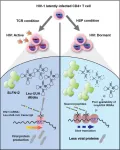These members include pioneering researchers who have made notable contributions to science as well as rising stars on the path toward important breakthroughs. This group will bring diverse expertise in immunobiology to lead groundbreaking research that will deepen our understanding of the immune system and bring the benefits of immunotherapy to all patients.
“We are proud to be joined by these stellar scientists, and we are confident that together we will set the tone for the exceptional research we aim to support at the Allison Institute,” said Allison, director of the Allison Institute and regental chair of Immunology at MD Anderson. “Our collective expertise in areas that now will include immune-microbiome interactions, epigenetic mechanisms, and novel methods for spatial transcriptomics and proteomics fits well with our priority research areas, and we look forward to collaboratively advancing the field.”
The Allison Institute was launched to drive breakthroughs that will integrate immunobiology across disciplines. Building on a deep commitment to discovery science, Allison Institute members will incorporate laboratory and clinical insights to develop novel and synergetic therapies that enable cures for more patients.
“MD Anderson is committed to integrating exceptional science across disciplines to deliver meaningful advances for patients,” said Giulio Draetta, M.D., Ph.D., chief scientific officer at MD Anderson. “The Allison Institute and its members are a testament to that approach, and I look forward to the collective discoveries to come from these researchers working seamlessly together and across the institution.”
New members bring diverse expertise, include rising stars and established scientists
Institute members are selected based on alignment with research priority areas and are approved by the Allison Institute director and scientific advisory board.
Membership levels include:
Core Members: Established researchers who are widely recognized for their research contributions Associate Members: Mid-career researchers who have made significant contributions to the field Assistant Members: Rising stars who have made impactful early contributions to the field Adjunct Members: Established scientists at outside institutions collaborating with the Allison Institute Core, associate and assistant members are provided with seven years of research support aligned with their membership level. In addition, they have joint appointments in MD Anderson academic departments, enabling them to collaborate seamlessly with clinicians and scientists across the institution. Adjunct members are recruited to collaborate with the Allison Institute and provided resources to support specific projects aligned with the institute’s research goals.
“Our members represent the top minds from around the world, with diverse skill sets and backgrounds, and we are pleased to expand understanding through our work at the Allison Institute,” said Sharma, director of scientific programs for the Allison Institute and professor of Genitourinary Medical Oncology and Immunology at MD Anderson. “Through our unique research model, we aim to unleash their individual brilliance in a collaborative and inclusive environment and to train the next generation of immunotherapy leaders.”
In addition to their leadership roles, Allison and Sharma are appointed as core members and will continue to lead impactful research focused on optimizing the use of immunotherapy to improve patient outcomes.
James P. Allison, Ph.D., is recognized internationally for his foundational discoveries in T cell biology that launched the field of cancer immunotherapy. For his contributions, he was awarded the 2018 Nobel Prize in Physiology or Medicine. His most notable discoveries include determining the T cell receptor structure and recognizing that CD28 is the major costimulatory molecule that allows full activation of naïve T cells and prevents anergy in T cell clones. His lab resolved a major controversy by demonstrating that CTLA-4 inhibits T cell activation by opposing CD28-mediated costimulation and that blockade of CTLA-4 could enhance T cell responses, leading to tumor rejection in animal models. He proposed and validated that blocking immune checkpoints, such as CTLA-4, can be a powerful cancer treatment strategy. These seminal findings established the field of immune checkpoint blockade therapy for cancer and led to the development of ipilimumab, the first FDA-approved immune checkpoint inhibitor. Allison’s current work seeks to improve current immune checkpoint blockade therapies and to identify new targets that will unleash the immune system to eradicate cancer.
Padmanee Sharma, M.D., Ph.D., is an internationally renowned physician scientist who pioneered the first neoadjuvant clinical trial with immune checkpoint therapy in 2006, establishing safety and clinical responses in order to advance immunotherapy toward earlier disease stages. Her work also provided the first clinical data demonstrating that bladder tumors can respond to immune checkpoint therapy. Sharma performs extensive studies on patients’ tumor samples collected from neoadjuvant trials to define human immune responses within the tumor microenvironment and to identify mechanisms of response and resistance to checkpoint inhibitors. She has identified mechanisms of response to immune checkpoint therapy, including ICOS+ T cells, tertiary lymphoid structures and ARID1A mutations in combination with CXCL13 overexpression. Her work has also identified mechanisms of resistance, including VISTA+ myeloid cells, increased EZH2 expression in T cells, and loss of interferon signaling in tumor cells. These data enable Sharma to lead innovative pre-clinical and clinical studies testing new combination immunotherapies and biomarkers. As a core member, she will work closely with other researchers to build scientific teams that bridge multiple areas of expertise to design novel treatment strategies.
Jennifer Wargo, M.D., who joins the Allison Institute as a core member, is professor of Surgical Oncology and Genomic Medicine and director of MD Anderson's Platform for Innovative Microbiome and Translational Research (PRIME-TR). A world-renowned physician scientist, Wargo pioneered a new understanding of how the gut microbiome influences responses to immunotherapy and other cancer treatments. Through this research, she and her team have determined how microbiome changes can positively impact immunotherapy responses, leading to an ongoing dietary intervention trial in melanoma. As a core member, Wargo will continue to lead innovative research on the impact of the gut and tumor microbiome on cancer and immunotherapy responses. She is committed to advancing the understanding and treatment of disease through science, and she is deeply invested in working broadly with investigators to find better ways to treat, intercept and prevent cancer.
Sangeeta Goswami, M.D., Ph.D., joining as an assistant member, is assistant professor of Genitourinary Medical Oncology and Immunology at MD Anderson. A gifted physician scientist, Goswami both cares for patients with bladder and kidney cancers and conducts exceptional discovery and translational research that integrates the fields of epigenetics and immunology. She is leading pioneering studies focused on identifying epigenetic pathways that regulate differentiation and function of immune cell subsets. Goswami’s current research focuses on uncovering key epigenetic factors involved in primary and adaptive resistance to immunotherapy, especially myeloid cell-mediated suppressive pathways. This will guide strategies to target these factors and overcome immunotherapy resistance in tumors with high levels of myeloid cells, such as glioblastoma. She aims to design rational therapeutic combinations of epigenetic modulators and immune checkpoint inhibitors in a tumor-specific manner.
Kenneth Hu, Ph.D., joins the Allison Institute as an assistant member. Recruited from the University of California San Francisco through a Cancer Prevention and Research Institute of Texas (CPRIT) award, Hu will join MD Anderson as assistant professor of Immunology. His research interests are founded in developing novel tools to push the boundaries of measurable cell states and interactions. As a graduate student, he adapted atomic force microscopy to study single-cell generated forces and mechanical properties. While a postdoctoral researcher, he developed ZipSeq, a novel technique using light-based uncaging of nucleotides to barcode cells of interest and map single-cell sequencing data back to defined regions in a tissue. His research at MD Anderson will focus on broadening the applications of this technique to study spatial tumor heterogeneity and its role in dictating responses to immunotherapy.
Garry Nolan, Ph.D., who joins the Allison Institute as an adjunct member, is the Rachford and Carlota A. Harris Professor in the department of Pathology at Stanford University School of Medicine. His research interests include hematopoiesis, cancer and leukemia, autoimmunity and inflammation, and computational approaches for network and systems immunology. His efforts are aimed at enabling a deeper understanding of normal immune function as well as detailed substructures of leukemias and solid cancers and their interactions with the immune system. Nolan’s lab developed a novel approach for single cell analysis advance using a mass spectrometry-flow cytometry hybrid device, called “CyTOF.” His collaboration with the Allison Institute will focus on a second technology developed in his lab, CODEX (CO-Detection by indEXing). This innovative in situ imaging approach allows for the simultaneous visualization of dozens of proteins and/or RNA targets in a single tumor sample. Joining his expertise with patient samples collected by MD Anderson’s immunotherapy platform will help elucidate the interactions between tumor and cells in the immune microenvironment for both primary tumors and metastases.
- 30 -
END


